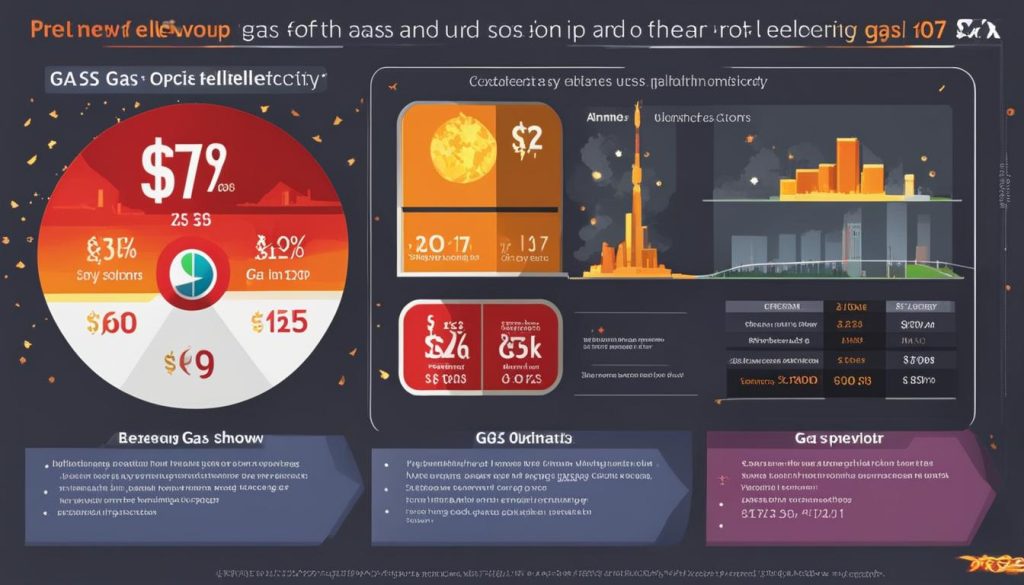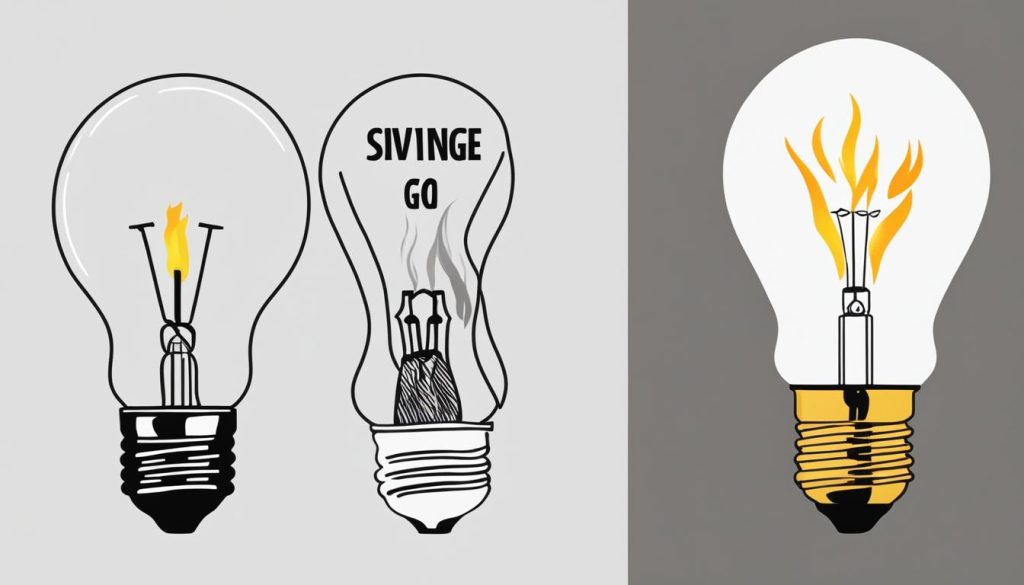Electricity vs Gas Costs: What’s Cheaper in the UK?
When it comes to household energy, choosing between electricity and gas can be a challenging decision. One of the most critical factors to consider is the cost of each option, which can significantly impact your monthly energy bills. In this section, we will explore the cost differences between electricity and gas in the UK and provide a comprehensive analysis of each energy source’s prices. By the end, you will be better informed about which option is more economical for your household needs.
Key Takeaways
- Understanding the cost differences between electricity and gas is essential when it comes to choosing an energy source.
- Several factors influence the pricing of both electricity and gas in the UK, including supply and demand, infrastructure costs, wholesale prices, and government policies.
- By comparing the pricing structures of electricity and gas, you can determine which option is more economical for your household energy needs.
- It is crucial to consider your energy consumption patterns, as this can play a significant role in determining which option is cheaper.
- Be sure to factor in any standing charges, unit rates, and tariffs when comparing electricity and gas prices.
Understanding Electricity and Gas Prices in the UK
To gain insight into which energy source is cheaper, it’s essential to understand the factors that influence the pricing of electricity and gas in the UK. Below is an in-depth analysis of these factors:
Supply and Demand
The cost of both electricity and gas is heavily influenced by the demand for each energy source at any given time. As demand increases, prices will typically follow suit as suppliers have to work harder to meet the demand. Conversely, when demand is low, suppliers may drop their prices to attract customers.
Infrastructure
The infrastructure required to generate, transmit, and distribute electricity and gas has a significant impact on the cost of both energy sources. For example, installing and maintaining the necessary infrastructure for electricity transmission is expensive, resulting in higher prices. In contrast, the infrastructure required for gas transmission is less complex and more affordable, leading to lower prices.
Wholesale Prices
Wholesale prices are another essential factor that influences the cost of electricity and gas. Wholesale prices refer to the cost that energy suppliers pay for the energy they provide to their customers. These prices fluctuate frequently and depend on various factors such as production costs, weather conditions, and international energy prices.
Government Policies
The UK government’s policies and regulations have a direct impact on how electricity and gas prices are determined. For example, the government levies taxes on energy suppliers, which can increase the overall cost of both electricity and gas. Conversely, the government may also provide subsidies to encourage the use of renewable energy sources, which can reduce electricity prices over time.
By considering each of these factors, you can gain a deeper understanding of how electricity and gas prices are determined in the UK.
To further your analysis and assist in making an informed decision, below is a table comparing the average prices of electricity and gas in the UK.

This table provides insight into the cost differences between gas and electricity in the UK, helping you determine which option best suits your home energy needs.
Conducting an Energy Cost Comparison
When it comes to choosing between electricity and gas for your home energy needs, cost is a crucial factor to consider. In this section, we will provide an overview of the typical pricing structures for both energy sources.
Standing Charges
| Electricity | Gas | |
|---|---|---|
| Standing charges | 15 pence per day | 27 pence per day |
Standing charges are a fixed daily cost that you pay regardless of how much energy you consume. As the table shows, gas has higher standing charges compared to electricity.
Unit Rates
Unit rates are the costs you pay per unit of energy consumed. The following table provides an overview of typical unit rates for electricity and gas in the UK:
| Electricity | Gas | |
|---|---|---|
| Unit rates | 18 pence per kWh | 4 pence per kWh |
As you can see, the unit rate for gas is significantly cheaper than electricity. However, it is important to note that gas-powered appliances tend to consume more energy than their electric counterparts.
Tariffs
Tariffs are pricing models used by energy providers that offer different rates based on your consumption patterns. The availability and specifics of tariffs depend on your supplier and your region. To find the cheapest tariff, you should compare the options offered by various energy providers.

By conducting an energy cost comparison, you can determine which option offers a cheaper energy solution for your household. Keep in mind that the right choice for you will depend on your energy consumption habits and the availability of suppliers in your area.
Conclusion
After conducting a comprehensive energy cost comparison, it is evident that the pricing structures for electricity and gas are vastly different in the UK. Factors such as supply and demand, infrastructure, wholesale prices, and government policies all play a significant role in determining the costs associated with these energy sources.
When considering the cost of electricity vs gas price, it is apparent that electricity is generally more expensive than gas. However, this may not always be the case, as the cost of electricity and gas comparison depends on various factors such as usage, location, and time of year.
Ultimately, it is essential to conduct your research and compare the costs of both energy sources to determine which is the cheaper energy option for your household. By considering the different pricing structures, standing charges, unit rates, and tariffs associated with electricity and gas, you can make an informed decision that will save you money in the long run.
Therefore, whether electricity or gas is cheaper for your home energy needs will depend on your usage and specific circumstances. It is recommended that you review your energy bills regularly and compare prices to ensure you are getting the best deal.
In conclusion, this energy cost comparison has highlighted the importance of understanding the factors that influence the cost of electricity and gas in the UK. By being well-informed and proactive in managing your energy usage, you can save money and reduce your environmental footprint.
FAQ
Is electricity cheaper than gas in the UK?
The cost comparison between electricity and gas in the UK varies based on several factors, including location, energy consumption, and individual supplier rates. It is recommended to conduct an energy cost comparison to determine which option is cheaper for your specific household needs.
How do I compare the prices of electricity and gas?
To compare the prices of electricity and gas, you can consider factors such as standing charges, unit rates, and tariffs offered by different energy suppliers. By analyzing the pricing structures of both energy sources, you can make an informed decision on which option is more cost-effective for you.
What factors affect the cost of electricity and gas in the UK?
The cost of electricity and gas in the UK is influenced by various factors, including supply and demand, infrastructure development and maintenance costs, wholesale prices, and government policies. These factors play a significant role in determining the overall price of electricity and gas for consumers.
Which energy source offers a cheaper option, electricity or gas?
The affordability of electricity or gas depends on several factors, such as your energy consumption patterns, home heating preferences, and individual supplier rates. It is advisable to conduct an energy cost comparison to determine which option offers a more cost-effective solution for your household’s energy needs.
Are there any government schemes or incentives that make electricity cheaper compared to gas?
The UK government has implemented various schemes and incentives to promote energy efficiency and the use of renewable electricity sources. These schemes, such as the Feed-in Tariff and the Renewable Heat Incentive, may provide financial benefits that can make electricity a more cost-effective option compared to gas for certain energy applications. It is recommended to research and consult with energy providers to understand the available incentives and their impact on costs.
Are there any benefits of using gas over electricity in terms of cost?
Gas may be considered a more cost-effective option for specific energy needs, such as space heating and cooking. Gas-powered appliances, such as boilers and ovens, may have lower running costs compared to their electric counterparts. However, it is important to conduct a comprehensive energy cost comparison to determine the most cost-effective option based on your specific requirements.




